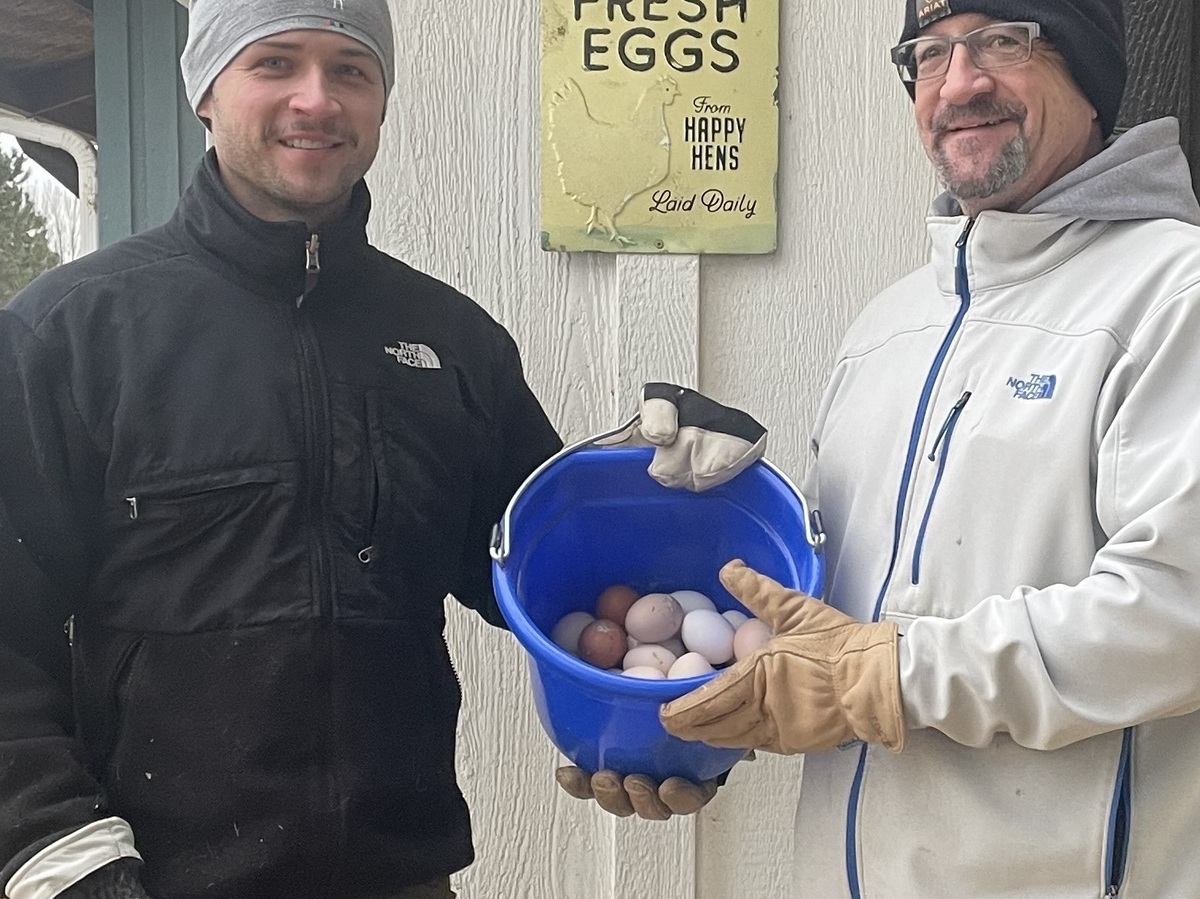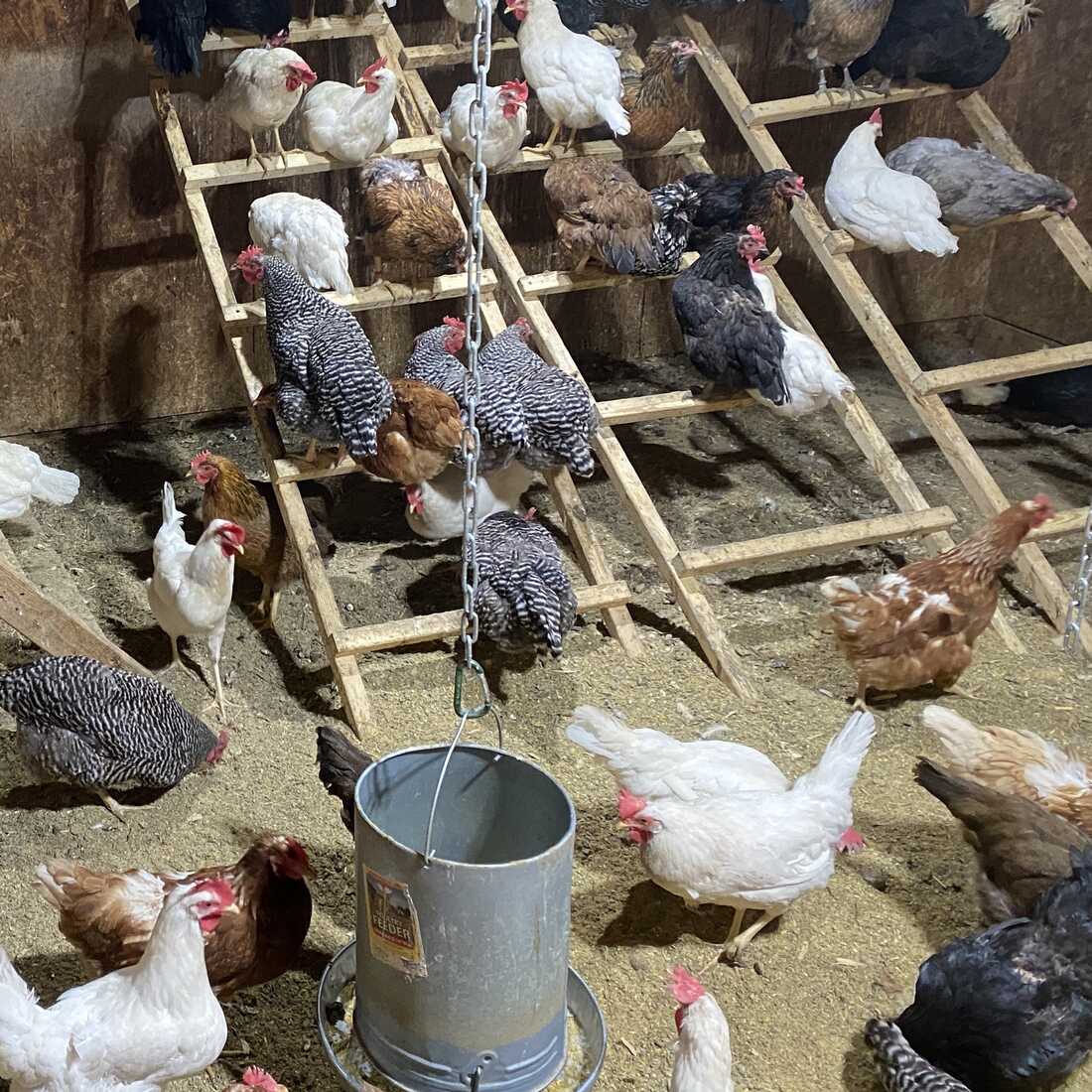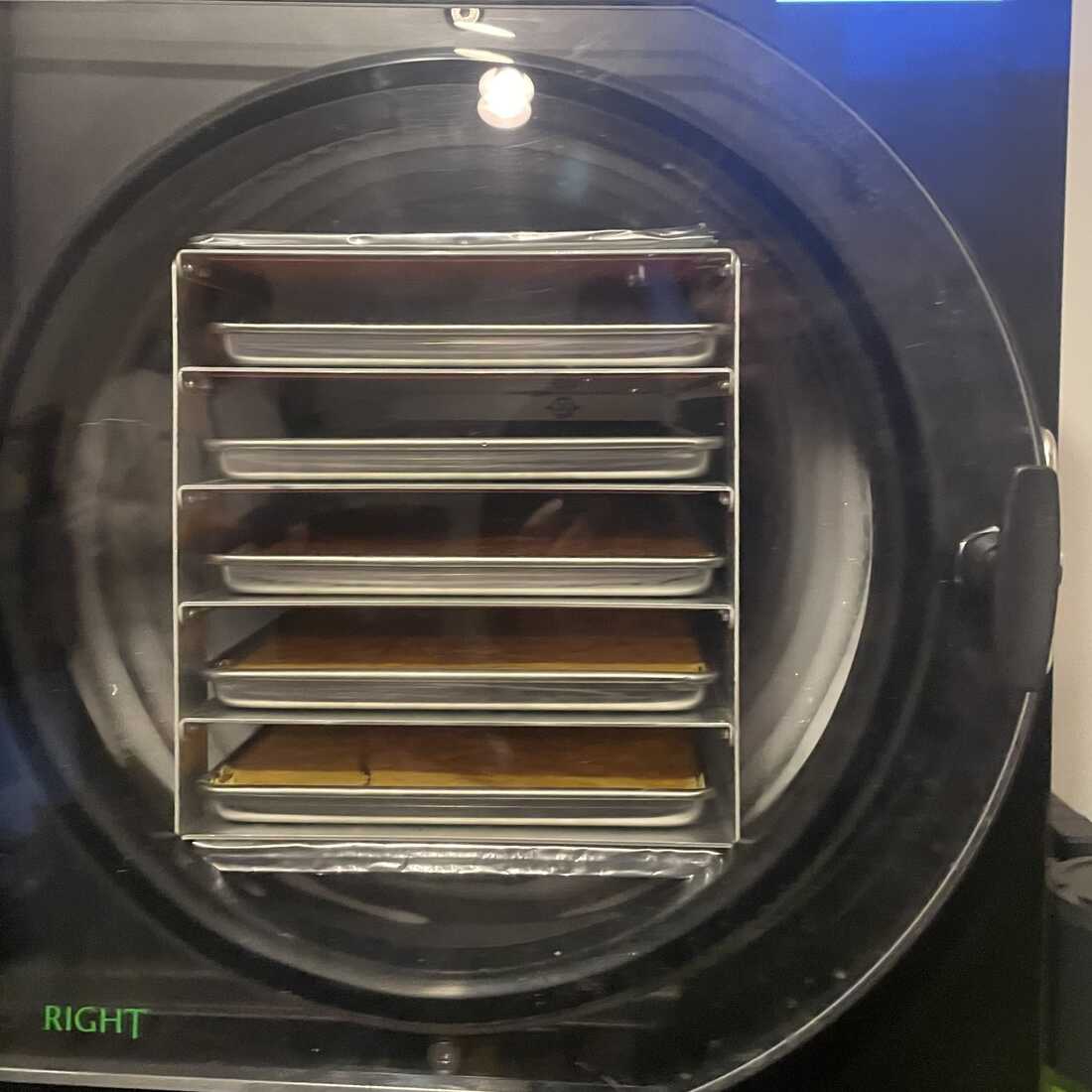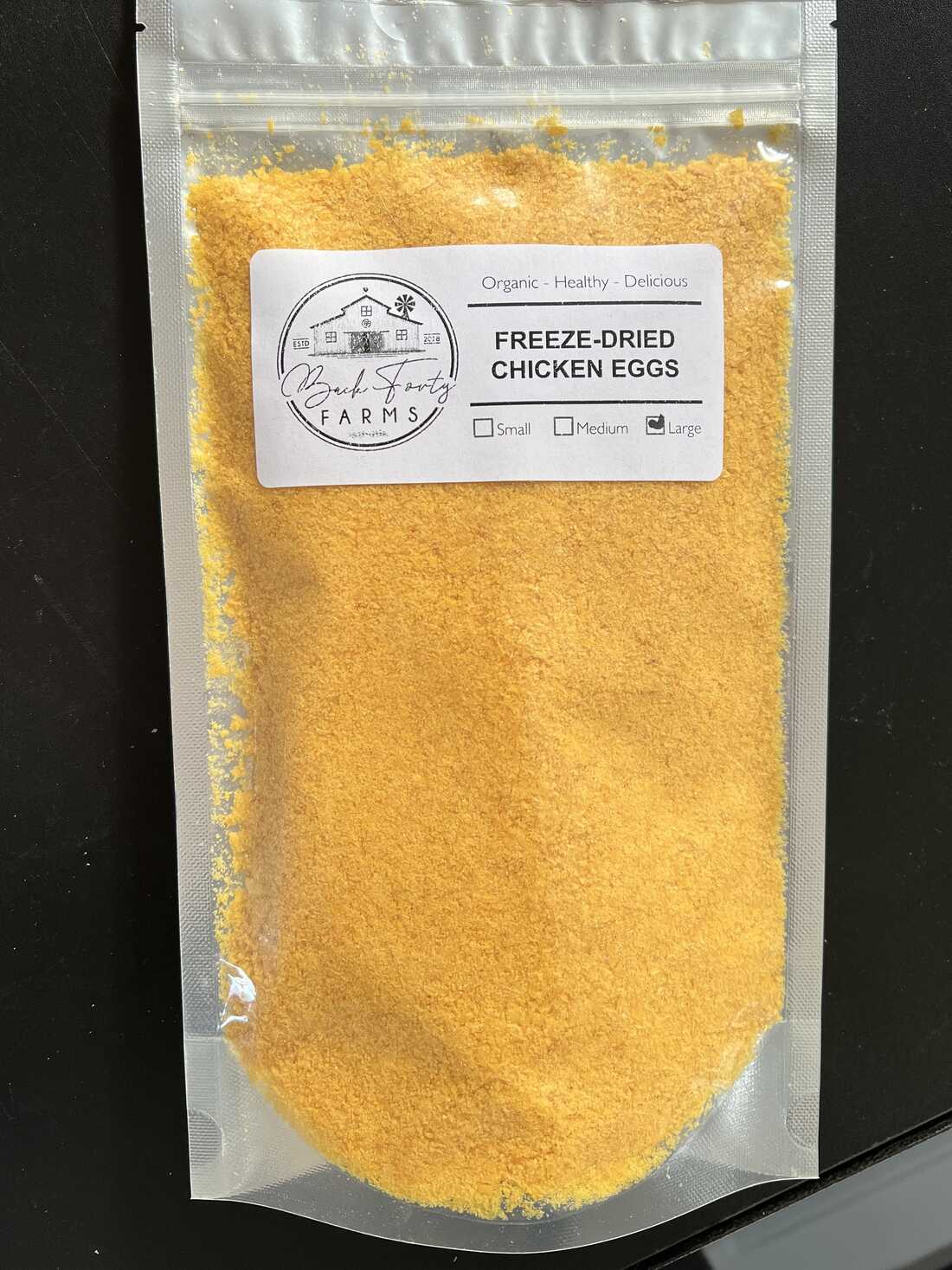A rooster crows on a new day at Back Forty Farms in Nampa, Idaho. Rising egg prices and shortages in some areas have created huge demand for Pack Forty’s freeze-dried eggs.
Again forty farms
Hide title
Change the title
Again forty farms

A rooster crows on a new day at Back Forty Farms in Nampa, Idaho. Rising egg prices and shortages in some areas have created huge demand for Pack Forty’s freeze-dried eggs.
Again forty farms
Americans love eggs. And it’s a consuming love. We eat about 280 eggs a year (more than half an egg a day).
But lately, that love has cost us dearly: Eggs cost approx Triple Ever since the pandemic started and egg shortages are hitting parts of the country. That combination has created a rare opportunity for people with disabilities.
Shocked consumers
Price of most food has risen over the past year Although this has caused a lot of shock and inconvenience to people across the country, the price of eggs has struck a certain chord. Eggs are often seen as a cheap, reliable source of protein – other ingredients can get expensive.
People get emotional when egg prices rise.
“It’s a hot button for consumers,” says chairman Bill Laub Advanced economic solutions, a food industry consultant. “It’s like driving down the highway and seeing the gas price at $5.30.”

Most eggs from pasture-raised chickens at Back Forty Farms are now freeze-dried and sold for $20 a dozen.
Again forty farms
Hide title
Change the title
Again forty farms
Of course, it’s not just emotional: The price of eggs has risen more than the price of almost everything else in the economy.
The reason? It has to do with the usual suspects: rising energy prices and rising costs for feed, packaging and labor.
Along with eggs, however, there is another culprit: the devastating bird flu that has killed millions of chickens in the past year. The supply of eggs in the United States has collapsed, and eggs are hard to come by in some places.
“A lot of people worry about not being able to get eggs,” says Ron Kern, a chicken farmer in Nampa, Idaho.
He hears this from his customers: They go to the supermarket and there are no eggs. “These big freezers are empty,” he says. People are worried that this will make it harder to find eggs.
That existential angst gave Kern an idea.

Ron Kern and his son, Tony, show off some of the eggs they collected outside their chicken coop at Back Forty Farms in Nampa, Idaho.
Stacey Vanek Smith
Hide title
Change the title
Stacey Vanek Smith

Ron Kern and his son, Tony, show off some of the eggs they collected outside their chicken coop at Back Forty Farms in Nampa, Idaho.
Stacey Vanek Smith
Feeding time
Important runs Again forty farms In Nampa, Idaho, 4 p.m.—time to feed the chickens.
Kern walks into the coop with a bucket of feed and hundreds of chickens rush in from all directions: fluttering from their roosts, rushing in from outside.

In a chicken coop at Back Forty Farms in Nampa, Idaho, chickens arrive for feeding time.
Again forty farms
Hide title
Change the title
Again forty farms

In a chicken coop at Back Forty Farms in Nampa, Idaho, chickens arrive for feeding time.
Again forty farms
As the chickens eat their food, Ron Kern and his son Tony collect the eggs — a mix of green, blue, white and brown. They are very careful with them. These eggs are valuable. Especially now.
A few years ago, these eggs would have been packaged in boxes and sold for about $3 a dozen, but these days, most of them go straight to the freeze dryer.

A batch of eggs is then freeze-dried at forty farms.
Stacey Vanek Smith
Hide title
Change the title
Stacey Vanek Smith
Freeze dry gold dust
Instead of selling fresh eggs, Kern now freeze dries most of them.
Freeze driers are the size of a mini-fridge and ring in a small building near Kern’s chicken coop.
Kern and her son now clean, crack, beat and pour the collected eggs onto cookie sheets before they go into the freeze dryers.
Freeze driers reduce the eggs to a bright yellow powder. “Looks like gold dust,” Kern notes. “I think it’s some sort of gold dust, isn’t it?”

A package of freeze-dried chicken eggs costs about $20 a dozen. Eggs keep for over 20 years, weigh almost nothing and are easily stored. They sell as fast as Ron Kern can post.
Again forty farms
Hide title
Change the title
Again forty farms

A package of freeze-dried chicken eggs costs about $20 a dozen. Eggs keep for over 20 years, weigh almost nothing and are easily stored. They sell as fast as Ron Kern can post.
Again forty farms
The proof is in the profits
Kern charges $20 a dozen for his freeze-dried eggs. He tells me it’s a good deal: the eggs weigh almost nothing, keep for decades, lose no nutritional value and come stored in a small Mylar envelope.
And, more often than not, it gives customers peace of mind: they’ll still be eating their beloved breakfast despite the supply chain disasters, deadly flu, price gouging, and scarcity economics hurling our way.
The proof is in the profits. Monend Kern started selling her eggs online, and orders poured in from all over the country.
“Demand was rife,” he recalls. “Every single package we put on our online store sold out within 30 seconds. They… fly off the shelves,” he says, adding: “I’m not even a pun person, but there you go.”
(Incidentally, no one Not even government teachers (Reports are able to resist egg chunks — they’re inevitable.)
Economics vs Economics
Basic economics tells us that when the price of a good rises, people will buy less of it: demand falls.
But economics is a different story, says Bill Laub. Even if the price of eggs goes up, people buy them. This is what is called ‘inelastic demand’ in economics, meaning people will buy whatever they want.
Non-consistent demand is generally reserved for needs like petrol, electricity etc. Eggs are an exception.
“Demand for eggs is very inelastic,” says Lapp. “It’s a cheap source of protein, it’s convenient and consumers really like cracking that shell and cooking their eggs. Demand is slow to change.”
Any interest in an amaranth omelette?
Demand may be slow to change, but supply is a different story. Over the past few years, the unusual situation surrounding eggs has created a huge business opportunity for food companies.
All kinds of egg alternatives are on the rise: not only freeze-dried eggs, but also plant-based egg products. They are usually soy or bean-based liquids that resemble scrambled eggs when you cook them.
For the first time last year, substitute eggs were cheaper than real eggs. And, not surprisingly, sales of egg substitutes rose nearly 20%. According to Chicago-based market research firm IRI.
Just eggsIt makes a mung-bean based scrambled egg product Sales increased by around 17% Last year.
Right now, if you make something that looks like an egg, tastes like an egg, and costs less than an egg, you can make a lot of money.
An unscientific taste test
But do egg substitutes really taste like eggs? Do they stand a chance in getting between the Americans and their beloved eggs? I’ll get some of my NPR colleagues together and try some alternatives and see if they can crack the code.
I don’t think eggs are going to lose their superstar status anytime soon (one of my colleagues mentioned that plant-based eggs taste like potatoes, and another described them as “super interesting… but nothing like eggs”).

An informal taste test at NPR found that alternative eggs still didn’t crack the flavor index.
Stacey Vanek Smith
Hide title
Change the title
Stacey Vanek Smith

An informal taste test at NPR found that alternative eggs still didn’t crack the flavor index.
Stacey Vanek Smith
That’s it, the yolk
But never fear, egg lovers! Science is moving fast: The first plant-based fried egg Created by a startup in Israel and investors are pouring billions of dollars into food startups working to tackle the elusive egg.
One thing’s for sure: if egg prices rise and supply remains stable, consumers may become more aggressive in their search for egg kits.


